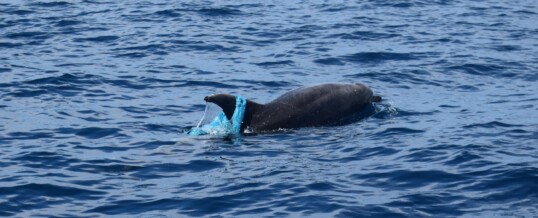
Humanity is immersed in “the era of plastic” where between 9 and 12 tons of plastic waste reach the sea through rivers, drains, coastal areas or are thrown directly into the sea every year. This is because the global production of plastics has exploded in the last 50 years. In addition, it is estimated that only 20% of everything produced is recycled.
The Canary Islands are strongly affected by marine microplastic contamination, since the Gulf Stream and the Canary Current drag all the marine litter that is dumped in northern Europe and the United States southward.
All these plastics that we find in the sea are one of the main threats to the animals that inhabit it. According to experts, the most lethal elements for animals are: fishing waste, plastic bags, balloons and single-use plastic utensils. If animals ingest these wastes, either because they mistake them for food or ingest them involuntarily, they can block their digestive system or become intoxicated with some of its compounds that affect their neurons. Another risk is that they get tangled up with bags or ropes when they play with them.
According to research, all the dolphins studied in the area contain contamination in their tissues and stomach, and up to 30% of the specimens have levels above the safety threshold.
During our outings we find large amounts of garbage, sometimes we can see the dolphins playing with plastic bags or with some of them tangled in their fins; turtles mistaking the bags for jellyfish (their main food) or ropes and nets hooked on some part of their body.
Plastic pollution is a red alert of what is happening on our planet, of the uncontrolled consumption of these elements. We have to be aware that this affects everything around us and it is in our hands to change it.
From our boat we contribute our grain of sand trying to collect all the garbage we find, taking it on board to the port. We try to get the little ones on board to help us collect waste, trying to raise awareness about the problem that these plastics pose. The sea is not a landfill without limits, it constitutes 71% of the Earth’s surface and it is essential for our survival and that of all the living beings that inhabit it that data begin to change. Change begins in each of us.
NOV
2022


About the Author:
We are a small group of Marine Biologists, Naturalists and Photographers living in Tenerife. When we don't have whale and dolphin watching tours you will find us out on the boat, exploring all the amazing marine wildlife of Costa Adeje, Tenerife. We love what we do, we support research and conservation projects and we hope you will join us.